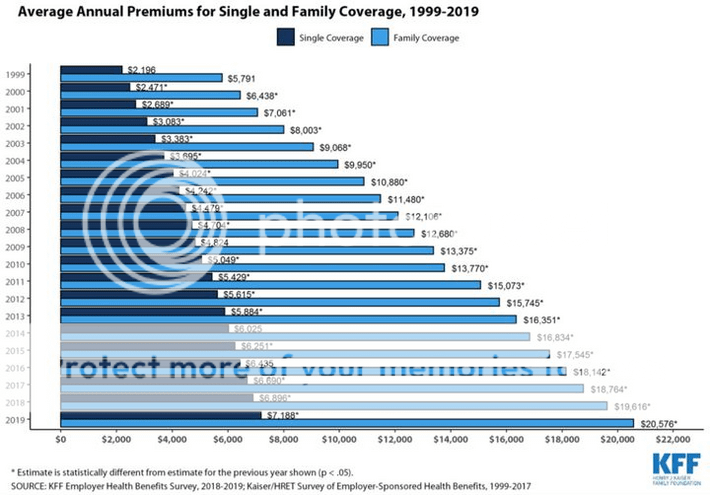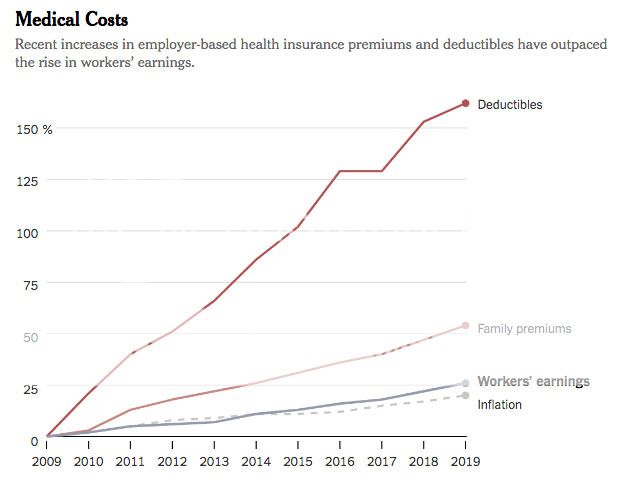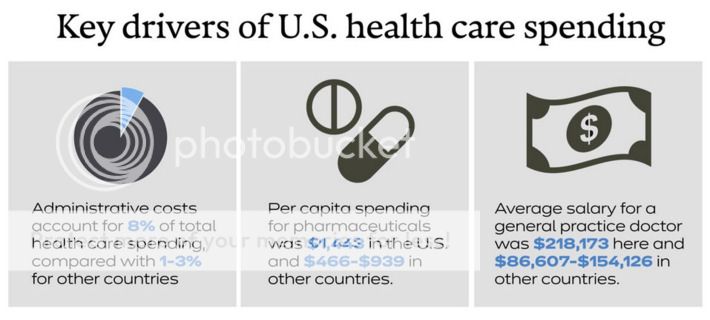Democratic Primaries
Related: About this forumAmericans' Health-Care Costs Are Too Damn High, Study Finds
...For these reasons, a lot of health-care punditry presumes that the public’s appetite for Medicare for All — or even a Medicare buy-in — will swiftly decline once Democrats have the opportunity to actually implement it. And that scenario remains plausible. But there’s increasing reason to believe that “next time will be different” — because with each passing year, those loss-averse voters with employer-provided insurance have less and less to lose: According to KFF’s latest survey, the average annual premium for a job-based, family health-insurance plan is now $20,756 — 54 percent higher than it was just ten years ago. And the price of such plans is rising even faster for their actual beneficiaries, as employers offload rising health-care costs onto workers: Since 2009, the average premium paid by employees for a family plan has jumped by 71 percent to $6,015.

Among workers themselves, the distribution of the growing burden is deeply regressive. Since high-wage workers have more bargaining power than low-wage ones, firms force far more cost-sharing on the latter than the former. As a result, an increasing number of low-wage workers are forgoing employer-provided coverage. As Bloomberg notes:
In firms where more than 35% of employees earn less than $25,000 a year, workers would have to contribute more than $7,000 for a family health plan … Only one-third of employees at such firms are on their employer’s health plans, compared with 63% at higher-wage firms …
Some employers have opted to keep premiums affordable by diverting rising costs into higher deductibles, a policy that effectively takes from sick workers to give to healthy ones. Which goes over well with the median worker — right up until he or she moves from that second category to the first.

It is true that, for most of the decade documented here, American public opinion on health-care policy actually trended rightward. One could attribute that fact to the Affordable Care Act’s peculiar failures, or to thermostatic public opinion. Either way, it is an argument against the assumption that worsening objective conditions will necessarily build public support for radical reform.
Still, it’s hard not to think that there will eventually be a breaking point. Absent massive policy changes, things are going to get worse before they get better. As the boomer generation ages, it will consume more and more health-care services, thereby driving up their price. Meanwhile, the burgeoning demand for drugs that ease the burdens of senescence is leading Big Pharma to roll out exorbitantly expensive new medicines. These demographic-driven cost pressures aren’t unique to the U.S. But America’s uniquely weak cost controls make them harder to absorb. Under our existing system, the U.S. spends several times more than similar nations on health-care administration, pharmaceuticals, and physicians’ salaries. In return, Americans enjoy the 29th best health-care system in the world (just behind the Czech Republic’s), according to the Lancet.

More at:http://nymag.com/intelligencer/2019/09/kaiser-survey-premiums-america-health-care-costs-study.html
primary today, I would vote for: Undecided
Hoyt
(54,770 posts)increasing and their doctors -- and even their nurses and other employees -- are going to get a big pay cut when we are forced to cut costs.
The supposed 6% cut in administrative costs and $600 per capita cut in drug costs (which are only about 8% of our health care costs anyway), ain't going to make make healthcare that much more affordable.
Providers -- doctors, hospitals, and other healthcare workers -- are going to take a hit too. That's probably long overdue, but Warren has yet to face the realities in standing firm for Medicare-for-All with the addition of dental, vision, hearing aides, etc., and no deductibles, no co-insurance, etc. That's likely a loser in general election, and will put us even further away from the goal of universal coverage.
primary today, I would vote for: Joe Biden
PatrickforO
(14,556 posts)She says, "Your costs will go down..." when asked if taxes for the middle class will go up.
I know you've read some of my rants on healthcare, so I won't belabor it. But I will say these things:
1. Warren, if elected, will surely work for MfA, but will end up having to come to compromise with the House and Senate. That's how our founders wanted it - lots of debate followed by compromise - so when each of these candidates is asked their specific plan by the 'gotchas' in the media, I always kind of shake my head. The truth is that the executive must work with a bicameral legislature to get any reform through. No matter if it is Warren, Biden (not my first choice) or Buddigieg. That's the reality.
2. I do believe my costs would go down because the government would be in a position in a MfA system to negotiate prices. Right now, my employer and I are paying a whopping 19.8% of my gross, just in premiums. When we add my copays, it's out of this world. If both my wife and I need to be hospitalized in the same year, I'm out six large. Seriously. That sucks. Who has that kind of money laying around? My ex pays $800/mo in premium with a $5K deductible. That sucks too.
3. That said, as an economist, I can tell you we must look to unintended consequences. Doctors here make more, it is true, but they have two huge cost centers - malpractice insurance and student debt payments. So, as part of reform, we've got to take a serious policy look and make some changes around medical school costs and loan forgiveness programs. I don't know what that looks like, but this conversation will need to take place.
4. Likewise the pharma pipeline processes need to be revisited. These greed companies (big pharma) maintain their costs to get drugs from inception to market is prohibitive, and it might be good for us to benchmark what other countries do around this.
I guess my point with all this, Hoyt, is that we've got to do SOMETHING, because due to Republican sabotage, our healthcare system has gotten almost as bad as it was before ACA. To my mind, as long as we get a public option, and the worst of the GOP meddling is fixed, I'm cool because I know we're making some progress in the RIGHT direction as opposed to passing more and more and more of the costs onto the consumer.
One other thought - I have been a public servant for my entire post-college career. I went into it because I wanted to help others, and to make a difference. As a person who has provided career guidance services to hundreds of individuals singly and in groups over about a 20 year period, I can tell you that for many people money is not the primary motivation in career choice. It wasn't for me, and I suspect it isn't for many healthcare professionals.
It seems to me as a person who grew up in the erstwhile middle class in the American suburbs, that our society has lost its ideals and fallen hook, line and sinker for this illusion that amassing wealth is the greatest purpose in life (or the other illusion, power). Because it isn't. If we organized ourselves around human need (yes I know you're rolling your eyes at my unicorn-ness here), we'd be a hell of a lot better off as a species, and every other form of life on this planet would also be better off.
![]()
primary today, I would vote for: Joe Biden
Hoyt
(54,770 posts)few years if they can't really pay back their student loans with a a starting salary well over $200K. Most decide they'd rather live in the city and let people suffer, than discharge their debt through public service.
With regards to malpractice insurance, it's not that high in family practice, general internal medicine, etc. Yet, we have a shortage in those specialties. Malpractice insurance goes up in some high risk specialties and in certain areas of the country like South Florida, but income goes up more than proportionately. Besides, surely you are not proposing to limit the thousands of patients injured unnecessarily by incompetent physicians from receiving just compensation.
Drugs are high, but as stats in article show, it's not that much more than other countries, and drugs are only about 8% of our healthcare expenditures. Heck, Canada does not even cover drugs in their system.
I agree that something needs to be done, including price controls and utilization controls. That means docs and hospitals will get less. As an economist, you know that will filter down to their employees.
But running on Medicare-for-All is likely a loser in the General Election because people are afraid of just one plan until someone demonstrates a government plan is better. I like my Medicare, but it is not anywhere near as cheap as people think.
But, we are in agreement that something needs to be done. I just wonder if voters as patients, and employees of the healthcare system, are willing to make the changes they will need to make in addition to those who directly profit handsomely from the system.
primary today, I would vote for: Joe Biden
PoindexterOglethorpe
(25,808 posts)is so much higher in this country. Is it really only because of price differences? Or are Americans taking far more pills than people in other countries?
primary today, I would vote for: Undecided
Uncle Joe
(58,255 posts)(snip)
Is it really that surprising that the U.S. spends more on prescription drugs than other nations? After all, we’re used to hearing about how obese and unhealthy we are.
It is true that Americans are slightly less healthy than people in other high-income countries, but one of our study’s most interesting findings was that, despite higher spending, Americans actually consume less of some classes of medicine. For example, Americans consume nearly 25 percent fewer “days of treatment” worth of hypertension drugs than people in comparable countries. So it’s not a phenomenon of greater utilization — you’re spending more but getting less.
And why do we think that is?
Well, in addition to looking at the utilization question, which doesn’t appear to be a significant factor, we looked at treatment choices, use of generics, and, of course, price. Treatment choices are definitely a factor — Americans tend to choose more expensive treatment options than their counterparts in other countries. But the factor that accounted for the lion’s share of the difference in spending was simply price. You pay more in the U.S. for the same drugs, somewhere between 80 percent and 150 percent more.
If they’re pharmacologically the same wherever you buy them, why do drugs cost so much more in the U.S. than elsewhere?
You might say it’s because they can be priced higher. In many countries with universal health coverage, there is a single entity that’s responsible for [purchasing drugs and] negotiating prices. Even in a small country, those purchasers can have enormous leverage in negotiating discounts or even setting allowable prices. The U.S. has a very different system with lots of buyers [such as Medicare, state Medicaid agencies, and private insurers] and no price controls. Couple that with higher list prices in the U.S., and even after the discounts some purchasers negotiate, you end up with substantially higher prices.
(snip)
https://www.commonwealthfund.org/publications/journal-article/2018/nov/whats-driving-prescription-drug-prices-us
primary today, I would vote for: Undecided
PoindexterOglethorpe
(25,808 posts)I suspect the answer is yes.
I'm frequently shocked at how many different medications many people are taking. Worse yet, they're taking medications to counteract the side effects of other meds.
I do know that we pay a lot more for many or most medicines in this country than they do elsewhere, which is genuinely criminal.
Someone told me recently that a round of chemotherapy can cost $30,000.
primary today, I would vote for: Undecided
Uncle Joe
(58,255 posts)that it's primarily driven by relentless mass marketing.
With no price limitations put in place by a central negotiator for the American People, available commercial funding would be virtually limitless.
primary today, I would vote for: Undecided
Humanist_Activist
(7,670 posts)of health care.
We already know that "market solutions" aren't going to work, as they have been tried repeatedly. Time for price controls.
primary today, I would vote for: Undecided
BeyondGeography
(39,339 posts)“I was all on board for Obamacare,” she said, but it proved not to be “a long-term solution. It doesn’t lower the costs for people.”
Ms. Wadsworth is wary of the sweeping plans now proposed by the Democratic presidential candidates, which she worries will become a political football, like the Affordable Care Act, and fail to address the underlying issues.
“I just think health care costs need to go down,” she said.
primary today, I would vote for: Undecided
Garrett78
(10,721 posts)My wife and I are both public employees and our health insurance sucks. The amount we have to pay out of pocket is ridiculous.
I have a cousin with rheumatoid arthritis and her doctor knows which medicine(s) are most likely to help her and which have almost no chance of helping, but she's been going through a long (and painful) process of trying different medications, because the insurance company insists that she start with the cheapest options and work her way up. That right there is the crucial difference between health care and health insurance. Our system is beyond fucked up--and I'm not just talking about health insurance. Buttigieg and others are spot-on when they say we need major structural reform and not just tweaks.
primary today, I would vote for: Undecided